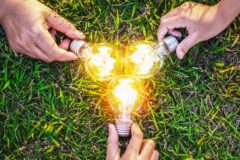To really decarbonise the energy systems we will need more than just new technologies and far-reaching organisational changes. Social acceptance and people’s participation in the energy transition also play a key role. Technical and social innovations must work together to bring about long-term and sustainable changes. Limited research has been done to date on how the transformation process will affect society and how the new technologies will be accepted and utilised by people.
The IEA User-Centred Energy Systems Technology Collaboration Programme (UsersTCP) was launched in 2019. Its aim is to provide insights from socio-technical research on the design, social acceptance and usability of clean energy technologies. Knowledge concerning users’ needs and behaviour is essential in order to develop successful strategies for a clean, efficient and safe energy transition. In the 2020-2025 period, the UsersTCP is focused on topics centring around user behaviour and where it plays a key role in determining energy consumption and flexibility in energy systems.
www.nachhaltigwirtschaften.at/en/iea/technologyprogrammes/users
“Social License to Automate”
Smart home applications enable energy to be used more efficiently and energy consumption to be reduced through smart control. Automated load shifting (demand side management) can be used to offset fluctuations in the power grid and improve grid flexibility. The IEA “Social Licence to Automate” project was focused on the conditions under which households and municipalities are prepared to allow this automated control. The follow-up project SLA 2.01 now involves experts examining how consent for automation can be supported with inclusive and community-based approaches. It focuses on three aspects:
> Gender and diversity factors: what role do they play in increasing the flexibility of energy consumption?
> Community effects: how can energy communities help promote a social licence to automate?
>F ocus on data: analysis of consumer load profiles to derive flexibility markers and data quality criteria from them
www.nachhaltigwirtschaften.at/en/iea/technologyprogrammes/users/iea-users-annex-sla2.0.php
1 Austrian project partners: AIT Austrian Institute of Technology, Energy Institute at the Johannes Kepler University Linz, University of Applied Sciences Technikum Vienna
International partners: University College Cork (Ireland), Delft University of Technology (Netherlands), NTNU Norges teknisk-naturvitenskapelige universitet (Norway), Chalmers University of Technology (Sweden), UIG Université de Genève (Switzerland), Western Sydney University (Australia)
![]()
Producing & sharing energy in solidarity
The “Energy with Spirit” flagship project brings together partners from business, science, research and the evangelical diaconal sector in order to implement a renewable energy community based on solidarity. The Bad Goisern evangelical boarding school (Upper Austria) and Donaustadt evangelical secondary school in Vienna are fixed starters and front runners. They both produce and consume clean energy. As well as benefiting the organisations that are taking part, the energy produced will also be passed on to socially disadvantaged and poverty-stricken households as well as people receiving basic care services and working poor people in the spirit of solidarity. In specific terms, this means that 10% of the energy produced in kilowatt hours or 10% of the profit generated in euros is earmarked for this purpose. The project aims to raise awareness of energy issues among all participants and demonstrate through co-creation and energy-related education how socially disadvantaged user groups can be integrated into the energy transition.
www.energywithspirit.at

